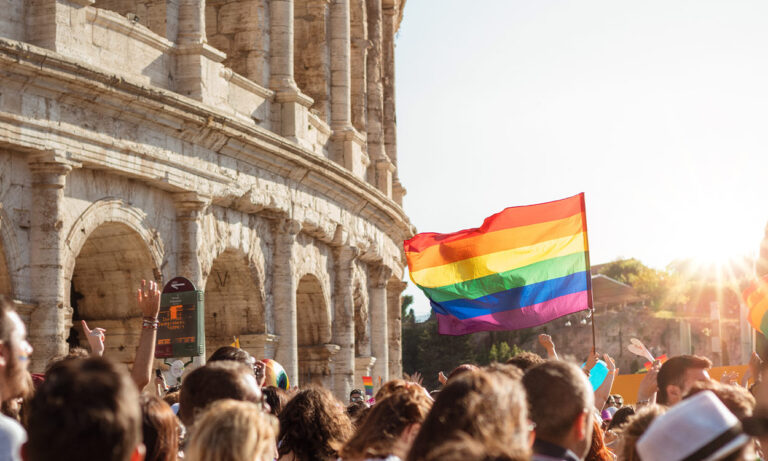Hundreds protest Italian right-wing prosecutor’s cancellation of birth certificates for lesbian couples

In Padua, Italy, a sit-in protest held by hundreds of women outside the Palace of Justice has brought attention to the ongoing struggles faced by same-sex couples in the country. The reason for the sit-in? The state prosecutor has declared that the birth certificates of 33 children born to lesbian couples are invalid, sparking outrage and intensifying the call for equality in Italy.
Why is Italy challenging its LGBTQIA+ laws?
In a disturbing turn of events, the prosecutor of Padua, Valeria Sanzari, has cast doubt on the legality of a child’s birth certificate issued by the municipality back in 2017. Apparently, having the non-biological mother’s name listed as the second parent on the certificate is just too much for Sanzari to handle. So, to rectify this ‘grave error’, the prosecutor has demanded the removal of the woman’s name from both the birth certificate and her own child’s surname.
But that’s not all. According to a statement from a spokesperson for Padua’s Mayor Sergio Giordani, seven more families received letters notifying them that their children’s birth certificates were considered invalid.
“These 33 cases are the same and all the couples will be notified,” Sanzari told the Italian news agency ANSA on Tuesday 18 July 2023. “I am obliged to enforce the law and with the current legislation, I cannot do anything else,” she added.
The reasoning behind this shocking turn of events? Well, according to the Padua prosecutor’s office, the idea of a child having two mothers is simply inconceivable under Italian law. Because, you know, progress and recognising the reality of diverse families is apparently too much to ask for.
Let’s not forget that Italy still refuses to legalise gay marriage, forcing non-biological parents in same-sex relationships to jump through endless legal hoops just to get a chance at adopting their own child.
And to add insult to injury, a court hearing has been scheduled for 14 November, a date that will surely be etched in the memories of these couples who are fighting for their basic human rights.
On Monday 17 July, Sky TG24 quoted the biological mother of one of the young children at the center of this story: “This is not just about repercussions on social life, but repercussions on one’s identity, until proven otherwise a fundamental right. A personal trauma at a delicate stage of development, from no longer having a brother and a mother.”
It’s a sad reality that in 2023, Italy is still stuck in the Dark Ages when it comes to recognising and protecting the rights of same-sex couples and their children. One can only hope that the upcoming court hearing will shed some much-needed light on the injustices being perpetrated by this government and pave the way for a more inclusive and accepting society.
Responding to the prosecutor’s actions, hundreds of women staged a peaceful sit-in outside Padua’s Palace of Justice. Holding up signs with powerful messages, they challenged the discriminatory stance of the legal system. One sign, in particular, resonated: “The teacher taught us that we are all the same. Didn’t your teacher teach you?”
This is the law in the UK on lesbian couples and birth certificates. Georgia Meloni is the far right Prime Minister in Italy who has stripped this right from Italian lesbians. My jaw is on the floor at GC women who supposedly support lesbian women but are tweeting that we should… pic.twitter.com/LZK11AgOcz
— Jean Hatchet (@JeanHatchet) July 17, 2023
Under the right-wing government led by Giorgia Meloni, the rights of same-sex parents have repeatedly been challenged, fostering an environment of exclusion and discrimination. Meloni’s anti-LGBTQ+ rhetoric during her election campaign in 2017 drew criticism from queer rights advocates, including Canadian Prime Minister Justin Trudeau.
Fortunately, Padua Mayor Giordani stands in contrast to the prosecutor’s office, offering support for including both mothers on birth certificates. Recognising the importance of preventing discrimination from the earliest stages of a child’s life, Giordani emphasised the urgent need for legislative reform to ensure equal recognition for all families in Italy. His stance provides a glimmer of hope for advocates fighting for the rights of same-sex couples and their children, suggesting that progress and positive change are within reach.
Italy’s Association of Rainbow Families, a prominent LGBTQ+ advocacy group, has strongly condemned the prosecutor’s actions, labelling them as “shameful” in a civilised country. The association went on to highlight the potential harm caused to children, who risk being erased and denied their family connections.
In response to the criticism, the Minister for Relations with Parliament, Luca Ciriani, defended Sanzari’s decision, citing the existing legal framework and a Supreme Court ruling.
The Italian quest for legislative change
The events unfolding in Padua underscore the urgent need for legislative reform to ensure equal recognition and protection of all families. As the Italian parliament debates the controversial ‘DL Varchi’ bill, which seeks to criminalise surrogacy arranged abroad, the discussion surrounding LGBTQ+ rights and family equality takes centre stage.
Italy finds itself at a crucial crossroads, faced with a critical choice. It’s time for the country’s leaders to set aside their regressive and bigoted stance and take meaningful steps toward creating a society that values and respects all families, regardless of sexual orientation.





